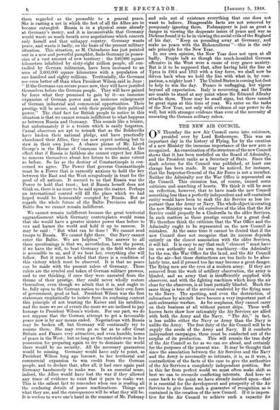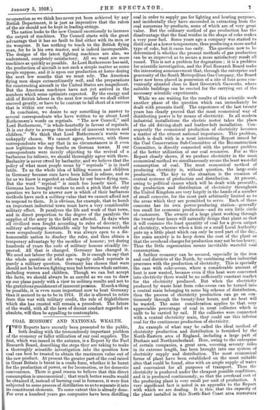THE NEW AIR COUNCIL.
ON Thursday the new Air Council came into existence, presided over by Lord Rothermere. This was an important day in the history 'of Flying, for by the creation of a new Ministry the immense importance of the new arm is recognized. An examination of the structure of the new Council shows that it has been modelled on the Board of Admiralty, and the President ranks as a Secretary of State. Since the draft scheme for the Council was published, at least one change has been made. It may be noticed, for instance, that the Inspector-General of the Air Force is not a member. Neither the Admiralty nor the War Office is represented on the Council. This omission has, of course, caused some criticism and searching of hearts. We think it will be seen on reflection, however, that to have made the new Council something less than a perfectly independent and self-contained entity would have been to rank the Air Service as less im- portant than the Army or Navy. The whole object in creating the new Ministry was to rid ourselves of the idea that the Air Service could properly be a Cinderella to the older Services. In such matters as these prestige counts for a great deal. We therefore think the criticism that the War Office and the Admiralty ought to be represented on the new Council is mistaken. At the same time it cannot be denied that if the new Council does not recognize that its success depends entirely on the closest association with the older Services, it will fail. It is easy to say that each " element " must have its own authority and its own machinery—the Admiralty for the sea, the War Office for the land, and the Air Council for the air—but these distinctions are too facile to be abso- lutely true, and if pressed too far may become a great danger. The flying men are the eyes of a modern army. If they are removed from the work of artillery observation, the army is blinded, and an army that is insufficiently supplied with observers, and with the fighting machines which keep the air clear for the observers, is at least partially blinded. Much the same thing is true of the services rendered by the flying man to the Navy. The spotting, and even the destruction, of submarines by aircraft have become a very important part of anti-submarine warfare. As for seaplanes, they cannot carry on their business at all without parent ships. These well- known facts show how intimately the Air Services are allied with both the Army and the Navy. " The Air," in fact, is less unlike either the Navy or Army than the Navy is unlike the Army. The first duty of the Air Council will be to supply the needs of the Army and Navy. If it conducts independent campaigns, these must be conducted out of the surplus of its production. This will remain the true duty of the Air Council so far as we can see ahead, and certainly for the purposes of the present war. It may be thought that since the association between the Air Services and the Navy and the Army is necessarily so intimate, it is, as it were, a contradiction of the facts of the case to give the authorities of the Air Services a completely independent position. But in this far from perfect world we must often make shift as best we can to reconcile conflicting interests. And here we come back to the point we have already insisted upon—that it is essential for the development and prosperity of the Air Services to give them such a guarantee of recognition as is contained in the creation of the new Council. If it is impera- tive for the Air Council to achieve such a capacity for co-operation as we think has never yet been achieved by any British Department, it just as imperative that the rulers of the air should not be kept in leading-strings. The nation looks to the new Council enormously to increase the output of machines. The Council starts with the great advantage that it has no fault to find either with its men or its weapons. It has nothing to teach to the British flying man, for he is his own master, and is indeed incomparable. The designs of the latest fighting machines are also, we understand, completely satisfactory. All we want are more machines as quickly as possible. As Lord Rothermere has said, the production of aircraft is not such a simple matter as some people suppose, and it is upon our production at home during the next few months that we must rely. The American flying men shape extraordinarily well, and the preparations for constructing aircraft in the United States are magnificent. But the American machines have not yet arrived in the numbers which some optimists expected. By the energy and skill of British labour in the next few months we shall either succeed greatly, or have to be content to fall short of a success that is within our reach.
In conclusion, we desire to say something in answer to several correspondents who have written to us about Lord Rothermere's words on reprisals. " The new Council," said Lord Rothermere, " is whole-heartedly in favour of reprisals. It is our duty to avenge the murder of innocent women and children." We think that Lord Rothermere's words were unhappily chosen. We cannot agree, however, with those correspondents who say that in no circumstances is it even now legitimate to drop bombs on German towns. If our correspondents were merely objecting to the revival of a barbarous lex talionis, we should thoroughly agree with them. Barbarity is never cared by barbarity, and we believe that the policy of what most people mean by " reprisals " is in itself futile. To us the whole idea of killing women and children in Germany because ours have been killed is odious, and so far as we know is regarded as odious by our brave flying men. But the word " reprisal " is much too loosely used. The Germans have brought warfare to such a pitch that the only question we have to answer now is which of their barbarous methods have such a military value that we cannot afford not to respond to them. It is obvious, for example, that to bomb an important industrial town must have a very considerable military effect. It paralyses the life and work of that town, and in direct proportion to the degree of the paralysis the supplies of the army in the field are affected. In days when all civilized men fought according to rules of decency, the military• advantages obtainable only by barbarous methods were scrupulously forsworn. It was always open to a dis- honourable nation to disobey the rules, and thus obtain a temporary advantage by the sacrifice of honour; yet during hundreds of years the code of military honour steadily im- proved. All that is changed. Germany has changed it. We need not labour the point again. It is enough to say that the whole question of what are vaguely called reprisals is purely a military question. Germany has chosen that wars should not be between fighting men but between whole nations, including women and children. Though we can but accept the facts, we should always be as careful as we can to draw up our plans purely with a view to military results and not to the gratuitous punishment of innocent persons. If such a thing be possible, it is even more important now to beat Germany than it seemed to us to be in 1914. If she is allowed to retire from this war with military credit, the rule of frightfulness which she has created will remain a precedent. The future of the world, with all the laws of decent conduct regarded as obsolete, will then be appalling to contemplate.



































 Previous page
Previous page